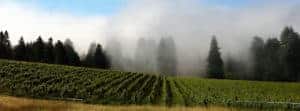 After so many years of writing about wine I experienced another epiphany yesterday. In the company of 75 gathered aficionados I listened to winemakers and viticulturists talk about their land, their soil, the tender regard they had for their particular slope of eden.
After so many years of writing about wine I experienced another epiphany yesterday. In the company of 75 gathered aficionados I listened to winemakers and viticulturists talk about their land, their soil, the tender regard they had for their particular slope of eden.
And as they talked, we tasted wines made from their grapes ranging throughout the appellation, a cross-section of four of the AVA’s distinctive winegrowing areas.  And in each of the four flights (four vineyards x three winemakers = a dozen wines), the individual personalities, desires, and  vitality of those vineyards unfurled.
Wine. A living work of art existing for the moment of time it takes to travel from sip, to palate, to memory. Liquid music.  Like music, wine is a living creation, existing as long as it is tasted (experienced, played). Music isn’t quite right as an analog, but it’s more apt than painting (too concrete) or sculpture (again, extant in a specific time and place). Music exists in many states—altered states, if you will. In Brian Eno’s head, on a cocktail napkin at Brian Eno’s favorite saloon, in Brian Eno’s computer (software program where it can be emailed to his friends and collaborators), and finally in both the real spacetime world, as well as infinitely in cyberspace.
What can wine do in a similar way? Well it can exist, sleeping in potentia, for the vineyard manager to sense its dormant potential. The winemaker tastes the grapes from time to time, and sure enough a oeno-identity begins to take shape in her or his consciousness. e.g. This is going to be an unusually spicy syrah. As they grow and ripen, the grapes begin to form ideas of their own, extracting the choice bits of mineral information and climactic tricks and driving them forward toward the future flavors.
Weather does whatever it does, for example dashing hopes of early ripening but perhaps diving deeper into flavor intensity with its geological moodswings. And so harvest comes, the brix and ph are what they are, and finally after picking before daylight, the winemakers receive their sacramental ingredients and begin to compose. The alchemy that  burnishes what the season, soil, and vineyard terroir have already supplied is the work of the winemakers. But it’s that flat out gamble, yes that’s exactly what it is, that gamble that something exceptional—and even if not exceptional at the very least something different — will result (after fermenting, racking, barreling, and waiting) that makes winemaking such a rush, such a heady art form. The composer can tinker endlessly, (and here’s where the analogy breaks down) but the winemaker still must work with the grapes which that season and that place has yielded.Â
Into the bottles! Then more waiting. Finally my hand reaches toward the shelf of bottles and I choose that wine to come home with me. I open it and let it be influenced by oxygen, teased into releasing all of its inherent flavor notes, its unique character. Only when I begin to taste the wine, does it finally fulfill its destiny. In that taste, in my mouth, the wine lives. And when that glass, that bottle, and finally that entire vintage are gone, the wine achieves its final incarnation—as a sensuous memory.
But I digress. (more to come…)

